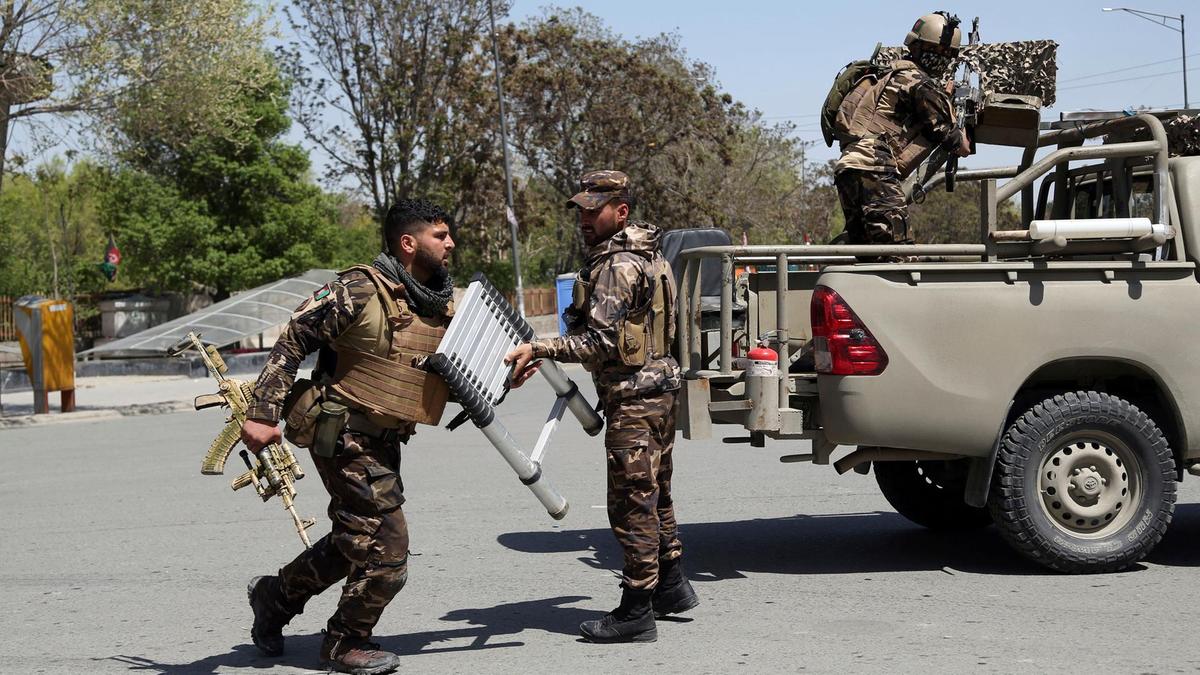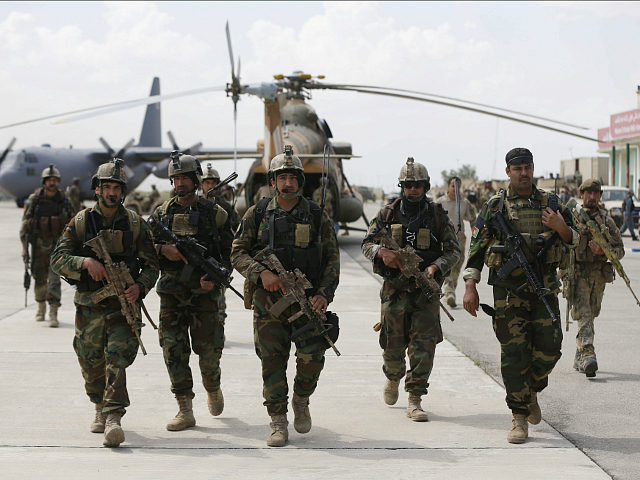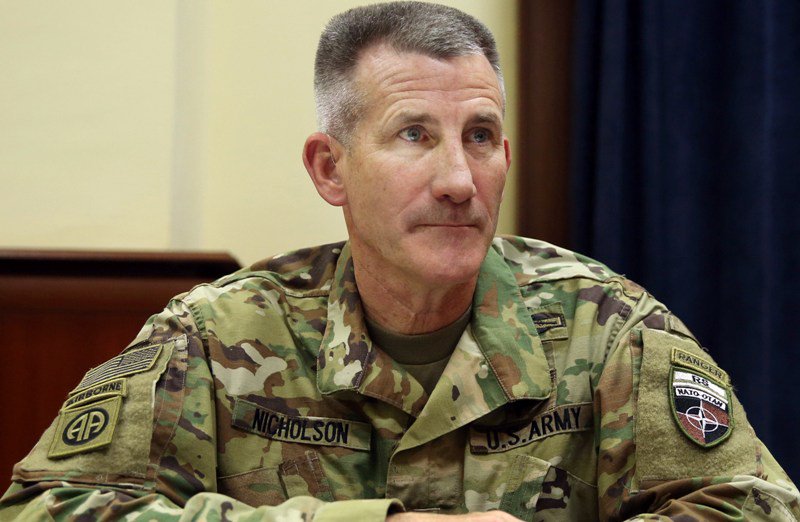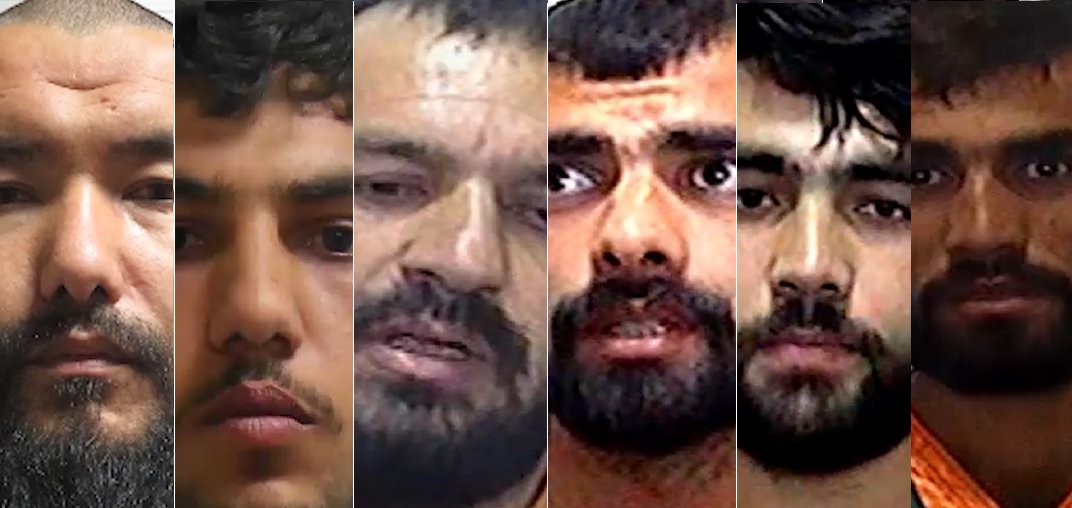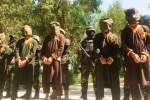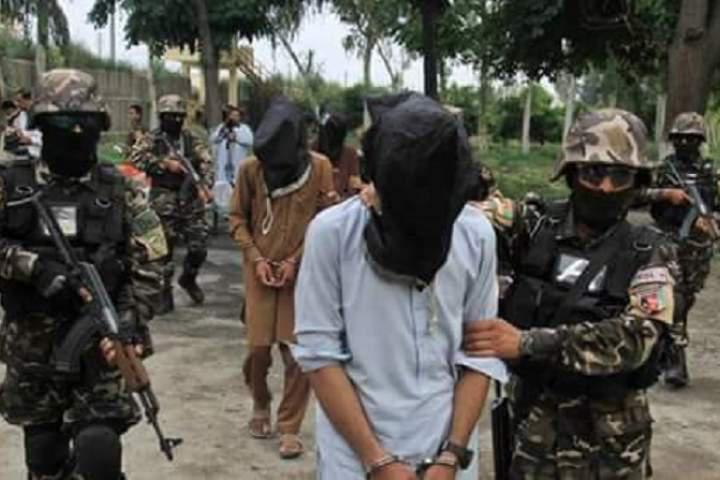Graan carries his assault rifle everywhere, even to the event organised by staff of the Afghan Telecom Regulatory Authority in Kabul to honour him and his colleagues for defending them from an ISIS attack.
Publish dateMonday 3 June 2019 - 02:11
Story Code : 186198
AVA- In fact, the 32-year-old member of the National Directorate of Security (NDS) forces was the only one of the 12 Afghan soldiers who walked into the corporate meeting room in full combat gear.
Graan, and his NDS colleagues Shoaib and Arif, both 36, have become heroes to the nearly 3,000 people they helped to protect during an attack on the compound housing the Afghan communications and IT ministry, Afghan Post and the ATRA on the afternoon of April 20. All three men asked the source that only their first names be used to protect their identity.
Five civilians and two members of the security forces were killed in the attack claimed by ISIS. A car bomb detonated at the front gates of the compound before three heavily armed entered. Besides rifles, handguns and ammunition, each was carrying a large dagger which officials believed were to be used for executions.
While Shoaib, Graan and Arif fought off the insurgents from inside the compound, members of the Afghan police's Crisis Response Unit engaged them from the outside. All three militants were killed after a gunbattle lasting more than four hours.
“I was at the front when the explosion happened. At first I thought it was a tyre bursting, but seconds later I saw smoke and I instantly knew that something wasn’t right," said Shoaib, describing how the attack unfolded to a rapt audience of ATRA employees in the meeting room.
"I grabbed my rifle and moved closer to the gate. My first reaction was to block the entry to the ministry building."
“My biggest concern was to defend my post, and not allow the insurgents to get past me," said Graan. "I said a prayer to give me the strength and I was prepared to die, but I wanted stay alive long enough to ensure that the terrorists didn’t enter the building.”
Besides maintaining contact with his two team members in the other parts of the compound, Graan was in constant touch with his father, an army veteran. “I had him on the speaker of my phone. He was not only giving me moral support to keep fighting but also sharing tactical advice,” he said.
The three men tried to keep up each other's morale through the hours of fighting. “They kept me going even when I had run out of ammunition, and thought it was over," Shoaib said. "Graan kept telling me to be brave and that he was there for us. It made us stronger.”
Their heroism moved all Afghans, who live in the constant shadow of death in such attacks by ISIS and the Afghan Taliban.
“We owe you our lives for protecting us on that black Saturday,” said Mohammad Najeeb Azizi, the ATRA chairman.
“You stood as the front line to protect us. You took the bullets for us. We will always remember this, and support you,” added Naqibullah Sailab, the deputy chairman, who described how two soldiers stood around him to shield him from bullets while he was being rescued.
To show their gratitude, the ATRA employees agreed to contribute part of their salaries to a fund to reward their defenders.
Two days after the attack, Mr Azizi and the board invited all departments for meetings, said Haroon Azim, the chief of staff at the authority. "We all agreed we wanted to do something for the security forces, and that is when we created this fund."
The contributions came from all levels, from board members who put in five days' pay, to maintenance staff who gave up two days of wages. Altogether more than 200 staff members collected close to one million Afghanis (Dh45,800), which was divided among the 12 surviving security officers and the families of the two who were killed.
“There is nothing we can say that will be enough. You deserve more than this,” said Mr Azizi.
Among the contributors was Suhaila, 52, a cleaner who is one of the longest-serving employees. Despite being one of only two breadwinner in a family of 10, she offered two days' wages, a little over 1,500 Afghanis, towards the fund. “First it was God, and second it was these security forces who saved us. They are the reason we are alive today," she said. "We owe our lives to them. What is a few hundred Afghanis for being alive?”
However, the attention their heroism received has also put Graan and his comrades in danger of being recognised and targeted by those they defeated. Which is why he always has a weapon by his side.
“I carry it with me everywhere I go. I can’t let my guard down,” he told media.
“People take selfies with us and upload them after such attacks, and then forget about it. But for us, our faces and our identities are out there for the enemies to see.”
But Graan said neither he nor his colleagues were afraid of dying.
“They [the insurgents] think they will get martyrdom if they die, they think will go to heaven. But they won’t because what they are doing is so wrong and against Islam," he said.
"They don’t realise that we will be the real martyrs if they kill us, because we will die in the service of our people.”
Graan, and his NDS colleagues Shoaib and Arif, both 36, have become heroes to the nearly 3,000 people they helped to protect during an attack on the compound housing the Afghan communications and IT ministry, Afghan Post and the ATRA on the afternoon of April 20. All three men asked the source that only their first names be used to protect their identity.
Five civilians and two members of the security forces were killed in the attack claimed by ISIS. A car bomb detonated at the front gates of the compound before three heavily armed entered. Besides rifles, handguns and ammunition, each was carrying a large dagger which officials believed were to be used for executions.
While Shoaib, Graan and Arif fought off the insurgents from inside the compound, members of the Afghan police's Crisis Response Unit engaged them from the outside. All three militants were killed after a gunbattle lasting more than four hours.
“I was at the front when the explosion happened. At first I thought it was a tyre bursting, but seconds later I saw smoke and I instantly knew that something wasn’t right," said Shoaib, describing how the attack unfolded to a rapt audience of ATRA employees in the meeting room.
"I grabbed my rifle and moved closer to the gate. My first reaction was to block the entry to the ministry building."
“My biggest concern was to defend my post, and not allow the insurgents to get past me," said Graan. "I said a prayer to give me the strength and I was prepared to die, but I wanted stay alive long enough to ensure that the terrorists didn’t enter the building.”
Besides maintaining contact with his two team members in the other parts of the compound, Graan was in constant touch with his father, an army veteran. “I had him on the speaker of my phone. He was not only giving me moral support to keep fighting but also sharing tactical advice,” he said.
The three men tried to keep up each other's morale through the hours of fighting. “They kept me going even when I had run out of ammunition, and thought it was over," Shoaib said. "Graan kept telling me to be brave and that he was there for us. It made us stronger.”
Their heroism moved all Afghans, who live in the constant shadow of death in such attacks by ISIS and the Afghan Taliban.
“We owe you our lives for protecting us on that black Saturday,” said Mohammad Najeeb Azizi, the ATRA chairman.
“You stood as the front line to protect us. You took the bullets for us. We will always remember this, and support you,” added Naqibullah Sailab, the deputy chairman, who described how two soldiers stood around him to shield him from bullets while he was being rescued.
To show their gratitude, the ATRA employees agreed to contribute part of their salaries to a fund to reward their defenders.
Two days after the attack, Mr Azizi and the board invited all departments for meetings, said Haroon Azim, the chief of staff at the authority. "We all agreed we wanted to do something for the security forces, and that is when we created this fund."
The contributions came from all levels, from board members who put in five days' pay, to maintenance staff who gave up two days of wages. Altogether more than 200 staff members collected close to one million Afghanis (Dh45,800), which was divided among the 12 surviving security officers and the families of the two who were killed.
“There is nothing we can say that will be enough. You deserve more than this,” said Mr Azizi.
Among the contributors was Suhaila, 52, a cleaner who is one of the longest-serving employees. Despite being one of only two breadwinner in a family of 10, she offered two days' wages, a little over 1,500 Afghanis, towards the fund. “First it was God, and second it was these security forces who saved us. They are the reason we are alive today," she said. "We owe our lives to them. What is a few hundred Afghanis for being alive?”
However, the attention their heroism received has also put Graan and his comrades in danger of being recognised and targeted by those they defeated. Which is why he always has a weapon by his side.
“I carry it with me everywhere I go. I can’t let my guard down,” he told media.
“People take selfies with us and upload them after such attacks, and then forget about it. But for us, our faces and our identities are out there for the enemies to see.”
But Graan said neither he nor his colleagues were afraid of dying.
“They [the insurgents] think they will get martyrdom if they die, they think will go to heaven. But they won’t because what they are doing is so wrong and against Islam," he said.
"They don’t realise that we will be the real martyrs if they kill us, because we will die in the service of our people.”
avapress.net/vdccoeqs42bq4s8.-ya2.html
Tags
Top hits
